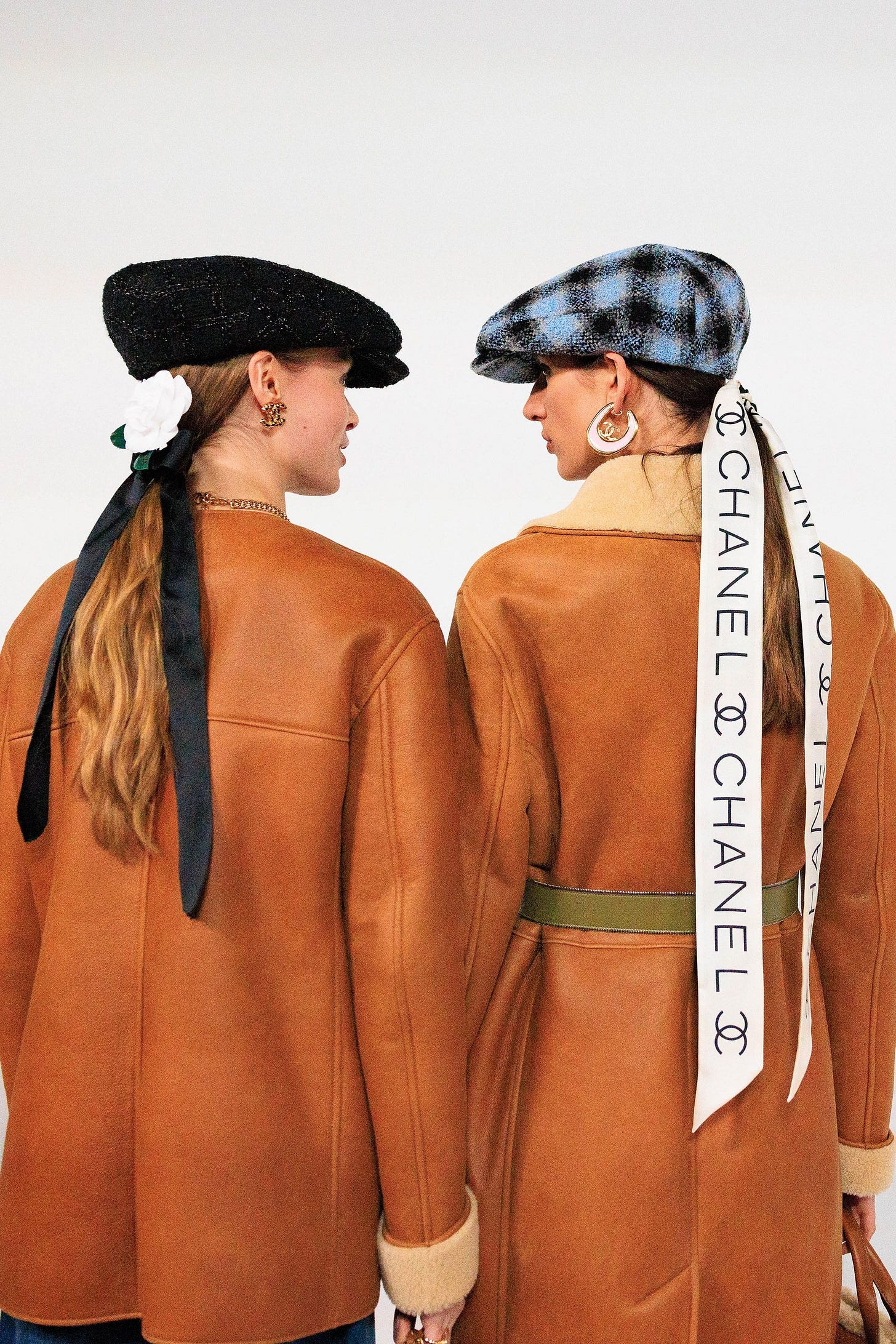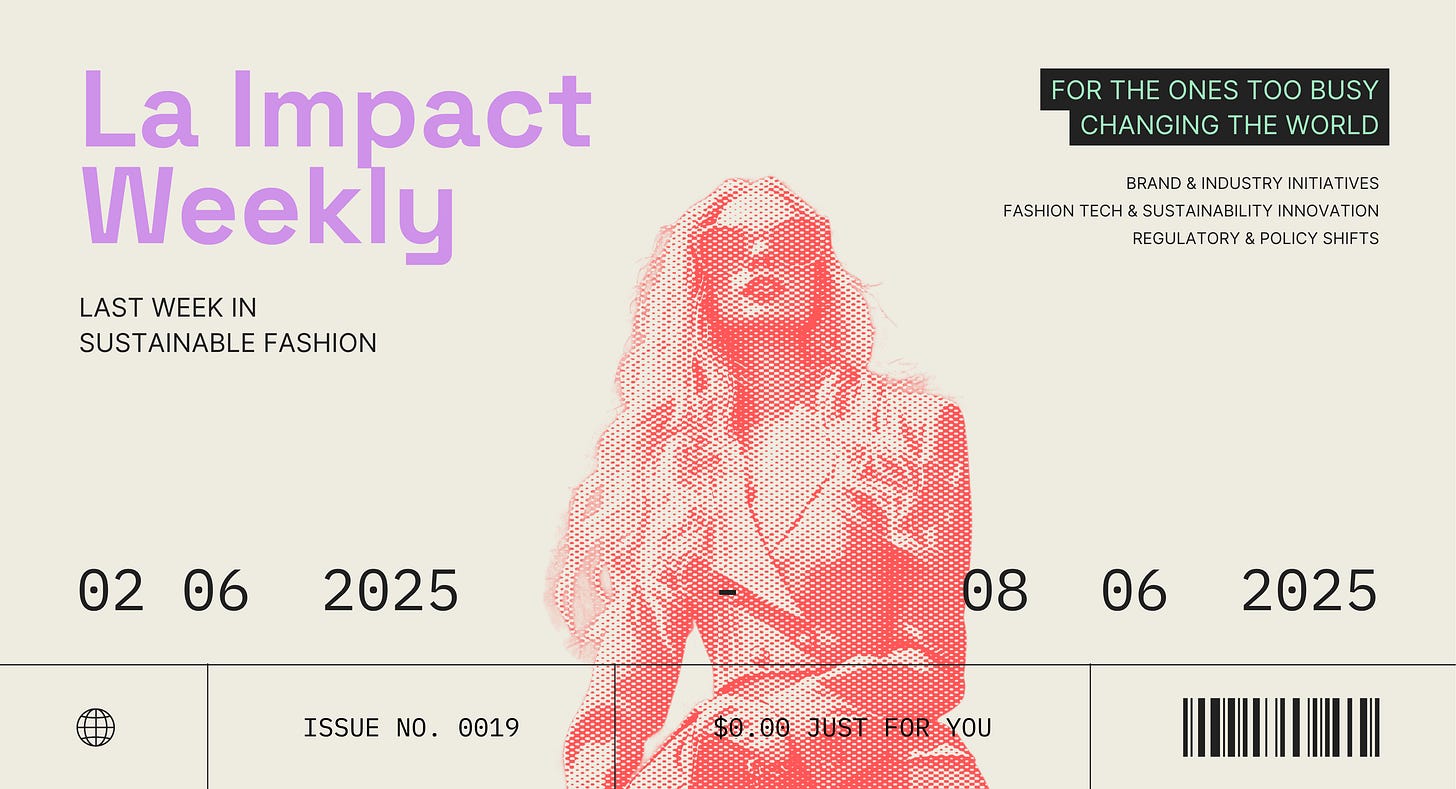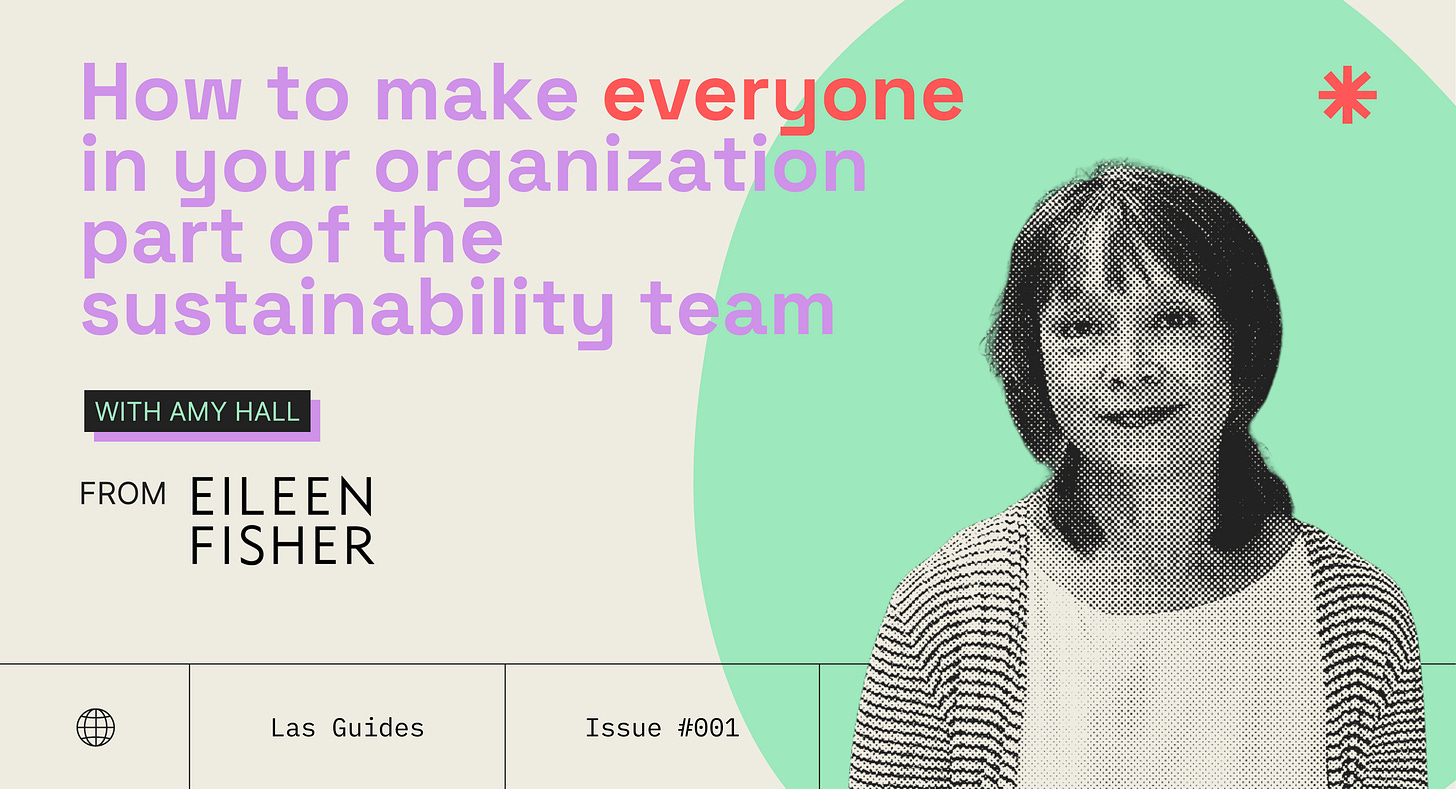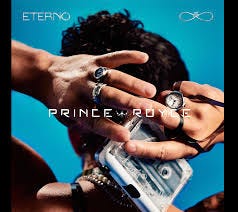Featured News: Nevold by Chanel
La Backdrop
In the EU, with circularity regulations coming up, brands will need to figure out what to do: destroying leftover inventory will be banned, and EPR regulations will incentivize recycled content and circular practices via eco-modulation (a fee system where brands using sustainable, recyclable materials pay lower fees). While Chanel claims it does not "destroy unsold products", the industry as a whole is panicking about what to do with their leftovers and overall circularity.
Here are some numbers to know: Fashion for Good reveals that next-gen materials could represent 8% of the total fiber market by 2030, when demand will outpace supply. And this is up from only 1% today. The gap between what we need and what we're getting? Massive. Biggest barrier? Getting long-term commitments from brands to iterate sufficiently to ensure they meet performance and price requirements.

Everyone's hoping to reach scale to meet those requirements. Recent moves include: H&M signed a $600Mn offtake agreement with Syre. Circ is opening a $500Mn French facility. Reju's Regeneration Hub One is doing its thing in the Netherlands.
Chanel? They seem to be playing a different game entirely. Circularity targets? Not their style, apparently. Instead, they've been quietly building their own circular empire.
Back in 2019, they created L'Atelier des Matières, basically a "recycling agent" company that dismantles unsold luxury pieces to salvage fabrics, yarns, chains, and leathers for reuse. Then they started partnering with their supply chain: Filatures du Parc, a French spinning mill doing high-quality recycled wool yarns, and Authentic Material, a start-up that turns leather waste into something useful again.
All of which makes this latest move feel less like an announcement and more like Chanel finally showing their hand. They've been building toward this for years while everyone else was still figuring out the rules.
Los Details
Chanel launched Nevold ("never old"), a standalone entity dedicated to developing recycled materials at scale, operating as a "third activity" alongside fashion and Métiers d'Art divisions. Led by former Patou CEO Sophie Brocart, Nevold functions as an open B2B platform serving external brands through L'Atelier des Matières, which dismantles end-of-life products and sorts materials by type. The platform develops hybrid materials combining recycled and virgin content to meet luxury manufacturing standards, working with partners including French yarn manufacturer Filatures du Parc and materials innovator Authentic Material. Chanel already integrates recycled threads into iconic tweeds and replaces plastic heel components with processed leather waste in slingback pumps, addressing scarcity of five key materials representing 80% of the brand's volume. Read more.
Mi Take
Are we witnessing the process and cost efficiency phase that Fashion for Good identified as crucial for scaling next-gen materials? It certainly looks that way.
Bruno Pavlovsky, president of fashion at Chanel and Chanel SAS, admitted to something: "Chanel is too small on its own to build the scale this requires. That's why we created a separate, open platform that can bring others in." This is more than just Chanel, it is about creating the pre-competitive collaboration the industry has been desperately seeking. Will other brands follow? Is Fiber Club a tell tale sign that they will?
Now, about those targets I mentioned before. Chanel doesn't have specific circular materials targets (well, except for gold), yet here they are with 30% of their handbags and 50% of their shoes already featuring recycled reinforcements through Nevold. Maybe the lesson here is that targets are less important than actual progress. That it is better to move the needle than to set targets and roll them back. While everyone else is busy setting goals, Chanel is quietly building the infrastructure to make circularity real.

But before we get too excited, here is what's interesting about Nevold's current focus: it's targeting unsold inventory, production offcuts, and post-industrial textile waste. NOT post-consumer waste. It is the easier place to start. We still need massive help with collection infrastructure for post-consumer waste, which makes me wonder how much impact it can truly have. Pre-consumer waste is estimated to be 10-15%, how are we solving the remaining 85-90%?
Regardless, this is genuinely exciting, and I'm here for it. But let's be honest: how do we address the root cause of overconsumption? I know I say this over and over and over and over…. again. But, all the circular materials in the world won't matter if we keep producing more stuff than the planet can handle. Nevold is brilliant, but it's still a supply-side solution to a demand-side problem.
Also, they could have come up with a better name, no?
If you're at an SME brand working on sustainability, or you just love the space, this is your place. La Impact Weekly 🫒 delivers the sustainability intel you need, straight to your inbox.
Other News
Brand & Industry Moves
🫒 Imogene + Willie launches natural indigo jeans from Cotton Project. The Nashville brand released jeans made entirely within a 400-mile radius using regeneratively-farmed Alabama cotton and natural indigo from Tennessee's Stony Creek Colors. Mount Vernon Mills produced the fabric, marking the first time the facility used natural indigo by stopping production and cleaning dye vats for the costlier alternative. The collection includes work pants and carpenter pants expanding the brand's locally-sourced Cotton Project beyond t-shirts. Read more.
🫒 SOLK launches first biocircular sneaker. Swiss startup founded by David Solk and Irmi Kreuzer launched the Fade 101, the world's first fully biocircular sneaker designed to return safely to nature. Built from 14 compostable materials including chrome-free German leather and natural rubber soles, the company offers a take-back service where returned shoes are composted with organic agents to create nutrient-rich soil. Read more.
Arvind and Fashion for Good launch Future Forward Factories. The Indian textile manufacturer partnered with Fashion for Good to create a blueprint for sustainable Tier 2 textile production and build a demonstration facility targeting 93% reduction in greenhouse gas emissions. The open-source blueprint will be released in September 2025, with the initiative backed by Laudes Foundation, Apparel Impact Institute, and IDH. Read more.
Decathlon launches circular business model in India. The sports retailer became the first in India to embed circularity at scale, launching repair services across 95+ stores, second-life resale in 90+ stores, and buyback programs in 50+ stores. The initiative aims to triple circular turnover by 2027 and divert over 300,000 sports products from landfills, following successful rollouts in France, Spain, Italy, Portugal, UK, and Poland. Read more.
Fashion Tech & Sustainability Innovation Updates
Recover and Intradeco announce strategic joint venture. Materials science company Recover partnered with manufacturer Intradeco to establish recycled cotton fiber production in El Salvador, targeting Central America's textile sector. The 75,400-square-foot facility opens in second half 2025 with expected capacity of 12,500 metric tons by end 2026. The partnership leverages CAFTA-DR trade benefits and addresses nearshoring demand, with initial production managed from Recover's Spanish facility during scale-up. Read more.
Reekom raises €4.5Mn for mechanized textile reconditioning center. French startup raised €4.5Mn to open a 3,500 square meter mechanized center in La Courneuve, Seine-Saint-Denis, tripling processing capacity to 100,000 units monthly by 2028. The company handles checking, cleaning, ironing, repairing, and photographing products for resale, currently processing 30,000 items monthly for brands including BonneGueule, Paradigme, Camif, and Veepee. Read more.
Upstream News
RMG workers protest factory closure over unpaid wages. Around 1,800 workers from Ssain Apparels Limited blocked roads Monday, demanding factory reopening and outstanding wages. The factory has been shut since February, with workers missing partial February income plus March and April payouts. Factory assets were sold before Eid to arrange some payments, but the absent owner has made further resolution impossible. Read more.
Regulatory and Policy Shifts
Switzerland proposes fur import ban. The Swiss Federal Council announced plans for an interim import ban on fur products from "mistreated animals" as a counterproposal to a citizen initiative that collected over 116,000 signatures. Parliament is expected to decide from summer 2025. Animal rights groups welcomed the move but criticized the narrow scope, noting that fur from animals killed by conibear traps (which often fail to kill instantly) remains exempt from the proposed ban. Read more.
France's Senate debates fast fashion curbs. France's Senate reviewed legislation last week targeting ultra-fast fashion imports, with a formal vote this Tuesday. The bill introduces a "bonus-malus" penalty system based on environmental costs and distinguishes ultra-fast platforms (launching up to 10,000 items daily). Over 100 amendments were filed, with key debates around advertising bans and constitutional concerns, as clothing volumes in France surged from 2.3 billion to 3.2 billion units between 2010-2023. Read more.
Canada releases anti-greenwashing guidance for companies. Canada's Competition Bureau issued final guidelines requiring future environmental claims like net-zero goals to be supported by "concrete, realistic and verifiable plans with interim targets." Read more.
European consumer group accuses Shein of manipulating shoppers. And, once again, SHEIN gets complaints. Pan-European consumer organization BEUC filed a complaint with the European Commission against Shein over deceptive tactics including countdown timers, pop-ups, infinite scroll, and frequent notifications designed to fuel overconsumption. The European Commission already warned Shein in May about breaching EU consumer law. Read more.
ICYMI: Los Hits from Last Week
Key Takeaways from the Global Fashion Summit 2025
I stayed up all night for you so I could write this. TL;DR:
Bangladesh workers earn $113/month but need $238 to survive.
74% of European consumers want sustainable fashion but can't tell sustainable brands apart.
Veja spends 0% on advertising while competitors spend 50-70% and grew from €5,000 to €200Mn.
EILEEN FISHER intentionally shrank revenue from $500Mn to $300Mn to stay true to values.
Climate adaptation is urgent, 80% of Cambodian factories exceed safe temperatures.
Read the complete breakdown here and discover how we're trying to "Frankenstein our way out" of a broken system.
How EILEEN FISHER Built a Company-Wide Sustainability Team
This is a special one for me. Not only because it was my first how-to guide, but because I got to interview the one and only Amy Hall. She defined EILEEN FISHER's sustainability strategy, and I interviewed her so you don't have to figure it out alone. Her tips?
Step 1: Get buy-in from the top, then pack the room.
Start with a business case.
Bring someone from the outside.
Aim high, think of the art of the possible.
Step 2: Find champions, then hold them accountable.
Build your superhero team.
Break big goals into small, actionable ones.
Reach the tipping point.
Step 3: Embed into the day to day, and define structure.
Make it part of their job.
Make it clear who owns what.
Create rhythms that stick.
Get the inside scoop and read how you can replicate this battle-tested approach at your brand.
I want to hear from you. Leave some feedback!
Los Resources of This Week
Podcast
How one brand is changing what it means to be sustainable
With all the sustainability marketing noise in fashion right now, this conversation with Izzie Kalaja from Frankie4 couldn't be more refreshing. Give it a listen if you're tired of green marketing fluff and want to hear what responsible business practices look like in reality. Listen here, and other previous selected podcasts here.
Reports
I will cover one of these in the coming week. Guess which one?
It Takes Many: Mobilising Collective Action for Sustainable Fashion
Zalando's new report confirms 71% of consumers want to shop more sustainably but barriers persist. Key insight: consumers see sustainability as shared responsibility expecting brands (77%), governments (66%), and social platforms (65%) to make sustainable fashion the default choice. Read here.
Circular Transition Indicators Sector Guidance for Fashion and Textile v2.0
The WBCSD updated their methodology to help fashion brands actually measure circularity beyond vague recycling goals. Essential reading if you want concrete frameworks to assess material loops, end-of-life fate, and where your blind spots really live. Read here
Textile Exchange updates Material Summaries
Textile Exchange released refreshed sustainability guidance for six priority fibers including cotton, polyester, and wool, covering climate, nature, and governance considerations with organic, recycled, and biobased subcategories. Read here.
EPR Fee White Paper: Understanding EPR in Textiles
WEFT breaks down the complex world of Extended Producer Responsibility fees and what they mean for fashion brands. Read here.
Upcoming webinars
The Role of Brands in Shaping the Climate Narrative (with Enviral & Finisterre), June 24, 2025
Enviral and Finisterre are tackling the big question: “do we need a new lexicon for the climate crisis to actually gain traction?” “Join communications agency Enviral; who are on a mission to stop global yawning, and Finisterre; one of the UKs most loved sustainable brands, as well as a series of national brands and thought leaders for an evening exploring the role of brands in the climate narrative.“ Join them in London.
Mi Corner
So here is a quick update on the personal front.
After working hard for the last couple of weeks, I am looking forward to relaxing and enjoying my birthday this weekend.
As some of you may know, I am working hard on building the AI traceability tool for SME brands and suppliers alike. I got suppliers on my mind this week. If you have any thoughts about how to make their experience better, I would love to hear from you.
Also, I have signed up for the challenge by re/make to buy #NoNewClothes. You can also take the challenge here.
Lastly, I am totally digging this new album by Prince Royce where he covers classics with a bachata and bilingual take. My favorite: the bachata version of How Deep is Your Love by the Bee Gees. Listen here.
Know someone who would dig this post? Spread the olives 🫒 and share.
Want this delivered weekly? Subscribe to La Purpose Brand. 🫒









